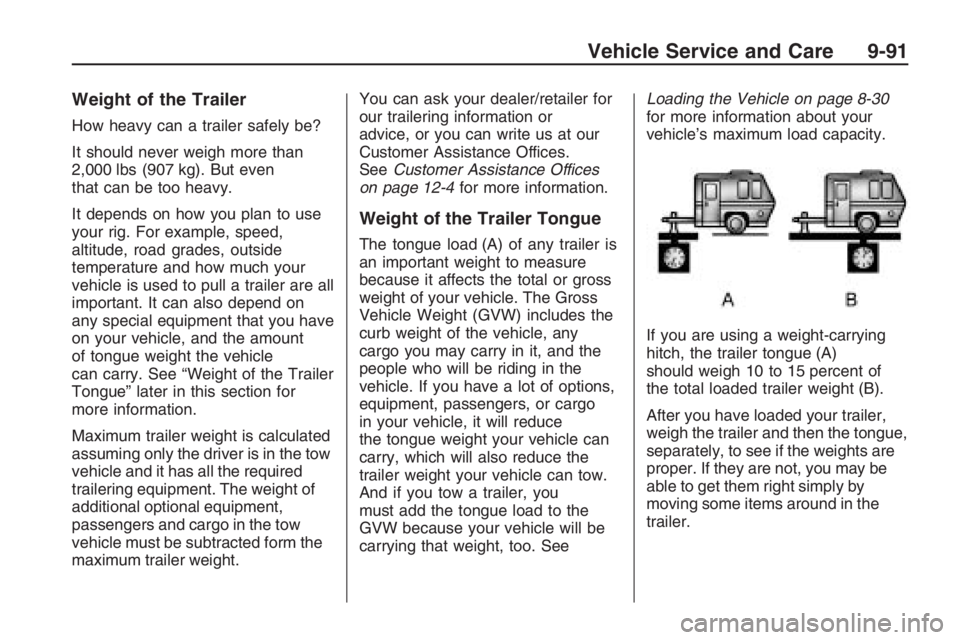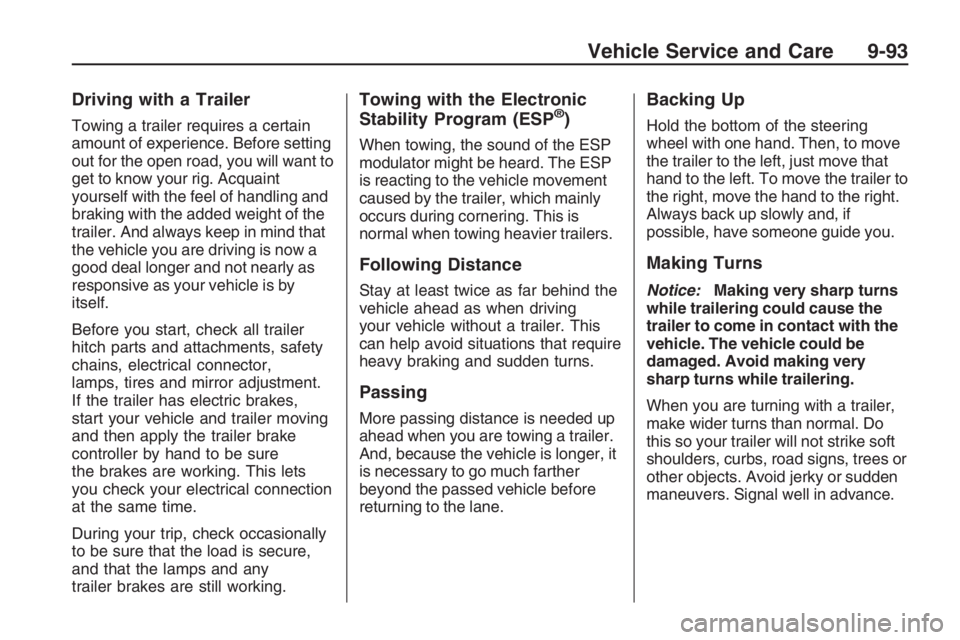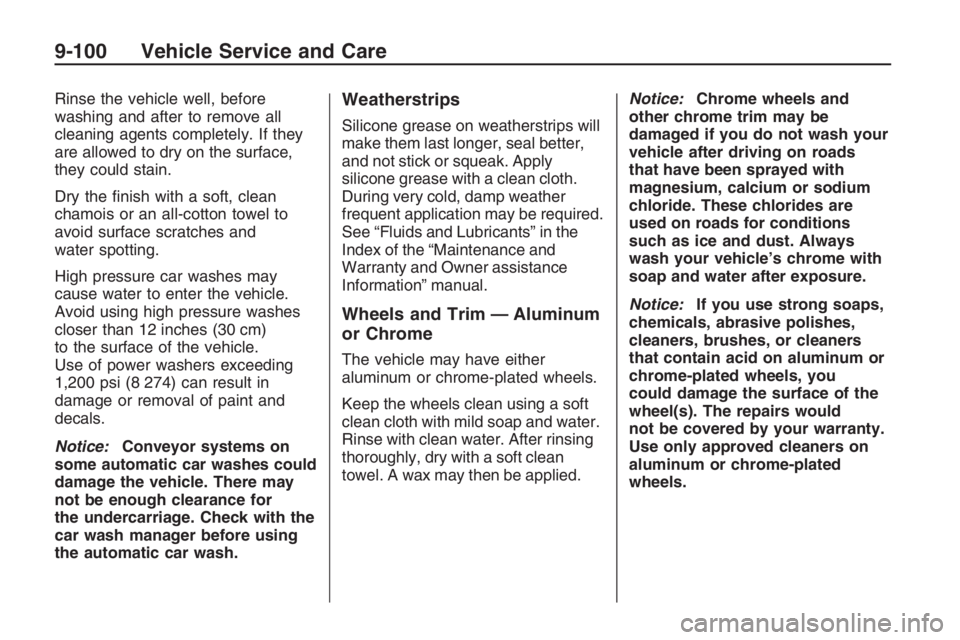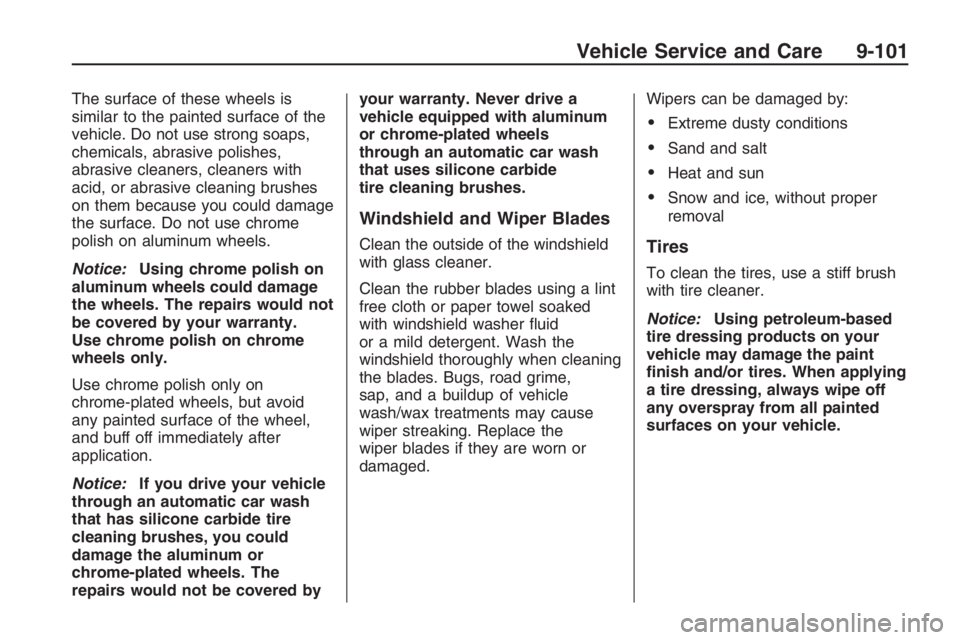2009 PONTIAC G8 tow
[x] Cancel search: towPage 295 of 356

Weight of the Trailer
How heavy can a trailer safely be?
It should never weigh more than
2,000 lbs (907 kg). But even
that can be too heavy.
It depends on how you plan to use
your rig. For example, speed,
altitude, road grades, outside
temperature and how much your
vehicle is used to pull a trailer are all
important. It can also depend on
any special equipment that you have
on your vehicle, and the amount
of tongue weight the vehicle
can carry. See “Weight of the Trailer
Tongue” later in this section for
more information.
Maximum trailer weight is calculated
assuming only the driver is in the tow
vehicle and it has all the required
trailering equipment. The weight of
additional optional equipment,
passengers and cargo in the tow
vehicle must be subtracted form the
maximum trailer weight.You can ask your dealer/retailer for
our trailering information or
advice, or you can write us at our
Customer Assistance Offices.
SeeCustomer Assistance Offices
on page 12-4for more information.
Weight of the Trailer Tongue
The tongue load (A) of any trailer is
an important weight to measure
because it affects the total or gross
weight of your vehicle. The Gross
Vehicle Weight (GVW) includes the
curb weight of the vehicle, any
cargo you may carry in it, and the
people who will be riding in the
vehicle. If you have a lot of options,
equipment, passengers, or cargo
in your vehicle, it will reduce
the tongue weight your vehicle can
carry, which will also reduce the
trailer weight your vehicle can tow.
And if you tow a trailer, you
must add the tongue load to the
GVW because your vehicle will be
carrying that weight, too. SeeLoading the Vehicle on page 8-30
for more information about your
vehicle’s maximum load capacity.
If you are using a weight-carrying
hitch, the trailer tongue (A)
should weigh 10 to 15 percent of
the total loaded trailer weight (B).
After you have loaded your trailer,
weigh the trailer and then the tongue,
separately, to see if the weights are
proper. If they are not, you may be
able to get them right simply by
moving some items around in the
trailer.
Vehicle Service and Care 9-91
Page 297 of 356

Driving with a Trailer
Towing a trailer requires a certain
amount of experience. Before setting
out for the open road, you will want to
get to know your rig. Acquaint
yourself with the feel of handling and
braking with the added weight of the
trailer. And always keep in mind that
the vehicle you are driving is now a
good deal longer and not nearly as
responsive as your vehicle is by
itself.
Before you start, check all trailer
hitch parts and attachments, safety
chains, electrical connector,
lamps, tires and mirror adjustment.
If the trailer has electric brakes,
start your vehicle and trailer moving
and then apply the trailer brake
controller by hand to be sure
the brakes are working. This lets
you check your electrical connection
at the same time.
During your trip, check occasionally
to be sure that the load is secure,
and that the lamps and any
trailer brakes are still working.
Towing with the Electronic
Stability Program (ESP®)
When towing, the sound of the ESP
modulator might be heard. The ESP
is reacting to the vehicle movement
caused by the trailer, which mainly
occurs during cornering. This is
normal when towing heavier trailers.
Following Distance
Stay at least twice as far behind the
vehicle ahead as when driving
your vehicle without a trailer. This
can help avoid situations that require
heavy braking and sudden turns.
Passing
More passing distance is needed up
ahead when you are towing a trailer.
And, because the vehicle is longer, it
is necessary to go much farther
beyond the passed vehicle before
returning to the lane.
Backing Up
Hold the bottom of the steering
wheel with one hand. Then, to move
the trailer to the left, just move that
hand to the left. To move the trailer to
the right, move the hand to the right.
Always back up slowly and, if
possible, have someone guide you.
Making Turns
Notice:Making very sharp turns
while trailering could cause the
trailer to come in contact with the
vehicle. The vehicle could be
damaged. Avoid making very
sharp turns while trailering.
When you are turning with a trailer,
make wider turns than normal. Do
this so your trailer will not strike soft
shoulders, curbs, road signs, trees or
other objects. Avoid jerky or sudden
maneuvers. Signal well in advance.
Vehicle Service and Care 9-93
Page 298 of 356

Turn Signals When Towing a
Trailer
When you tow a trailer, your vehicle
may need a different turn signal
�asher and/or extra wiring. Check
with your dealer/retailer. The arrows
on your instrument panel will �ash
whenever you signal a turn or lane
change. Properly hooked up, the
trailer lamps will also �ash, telling
other drivers you are about to turn,
change lanes or stop.
When towing a trailer, the arrows on
your instrument panel will �ash
for turns even if the bulbs on the
trailer are burned out. Thus,
you may think drivers behind you
are seeing your signal when
they are not. It is important to check
occasionally to be sure the trailer
bulbs are still working.
Your vehicle has bulb warning
lights. When you plug a trailer
lighting system into your vehicle’s
lighting system, its bulb warning
lights may not let you know if one of
your lamps goes out. So, whenyou have a trailer lighting system
plugged in, be sure to check
your vehicle and trailer lamps from
time to time to be sure they are
all working. Once you disconnect the
trailer lamps, the bulb warning
lights again can tell you if one of
your vehicle lamps is out.
Driving On Grades
Reduce speed and shift to a lower
gearbeforeyou start down a long or
steep downgrade. If you do not shift
down, you might have to use your
brakes so much that they would get
hot and no longer work well.
On a long uphill grade, shift down to
a lower gear and reduce your
speed to around 45 mph (70 km/h)
to reduce the possibility of engine
and transmission overheating.
Parking on Hills
{CAUTION
Parking the vehicle on a hill with
the trailer attached can be
dangerous. If something goes
wrong, the rig could start to move.
People can be injured, and both
the vehicle and the trailer can be
damaged. When possible, always
park the rig on a �at surface.
But if you ever have to park your rig
on a hill, here is how to do it:
1. Apply your regular brakes, but do
not shift into P (Park) yet.
2. Have someone place chocks
under the trailer wheels.
3. When the wheel chocks are in
place, release the regular brakes
until the chocks absorb the load.
4. Reapply the regular brakes.
Then apply your parking
brake, and then shift to P (Park).
5. Release the regular brakes.
9-94 Vehicle Service and Care
Page 299 of 356

When You Are Ready to Leave
After Parking on a Hill
1. Apply your regular brakes and
hold the pedal down while you:
Start your engine.
Shift into a gear.
Release the parking brake.
2. Let up on the brake pedal.
3. Drive slowly until the trailer is
clear of the chocks.
4. Stop and have someone pick up
and store the chocks.
Maintenance When Trailer
Towing
Your vehicle will need service more
often when you’re pulling a trailer.
See the Maintenance Schedule for
more on this. Things that are
especially important in trailer
operation are automatic transmission
�uid (don’t over�ll), engine oil, drivebelt, cooling system and brake
system. Each of these is covered in
this manual, and the Index will help
you �nd them quickly. If you’re
trailering, it’s a good idea to review
this information before you start
your trip.
Check periodically to see that all
hitch nuts and bolts are tight.
Engine Cooling When Trailer
Towing
Your cooling system may
temporarily overheat during severe
operating conditions. SeeEngine
Overheating on page 9-20.
Appearance Care
Interior Cleaning
Your vehicle’s interior will continue to
look its best if it is cleaned often.
Although not always visible, dust and
dirt can accumulate on your
upholstery. Dirt can damage carpet,
fabric, leather, and plastic surfaces.
Regular vacuuming is recommended
to remove particles from the
upholstery. It is important to keep
your upholstery from becoming and
remaining heavily soiled. Soils
should be removed as quickly as
possible. Your vehicle’s interior may
experience extremes of heat that
could cause stains to set rapidly.
Lighter colored interiors may require
more frequent cleaning. Use care
because newspapers and garments
that transfer color to your home
furnishings may also transfer color
to your vehicle’s interior.
Vehicle Service and Care 9-95
Page 301 of 356

Fabric/Carpet
Use a vacuum cleaner with a soft
brush attachment frequently to
remove dust and loose dirt. A
canister vacuum with a beater bar in
the nozzle may only be used on �oor
carpet and carpeted �oor mats. For
soils, always try to remove them �rst
with plain water or club soda. Before
cleaning, gently remove as much of
the soil as possible using one of the
following techniques:
For liquids: gently blot the
remaining soil with a paper towel.
Allow the soil to absorb into the
paper towel until no more can be
removed.
For solid dry soils: remove as
much as possible and then
vacuum.
To clean, use the following
instructions:
1. Saturate a lint-free, clean white
cloth with water or club soda.
2. Wring the cloth to remove excess
moisture.3. Start on the outside edge of the
soil and gently rub toward the
center. Continue cleaning, using
a clean area of the cloth each
time it becomes soiled.
4. Continue to gently rub the soiled
area until the cleaning cloth
remains clean.
5. If the soil is not completely
removed, use a mild soap
solution and repeat the cleaning
process that was used with
plain water.
If any of the soil remains, a
commercial fabric cleaner or spot
lifter may be necessary. When a
commercial upholstery cleaner or
spot lifter is to be used, test a small
hidden area for colorfastness �rst.
If the locally cleaned area gives any
impression that a ring formation may
result, clean the entire surface.
After the cleaning process has been
completed, a paper towel can be
used to blot excess moisture from
the fabric or carpet.
Leather
A soft cloth dampened with water
can be used to remove dust. If a
more thorough cleaning is
necessary, a soft cloth dampened
with a mild soap solution can be
used. Allow the leather to dry
naturally. Do not use heat to dry.
Never use steam to clean leather.
Never use spot lifters or spot
removers on leather. Many
commercial leather cleaners and
coatings that are sold to preserve
and protect leather may permanently
change the appearance and
feel of your leather and are not
recommended. Do not use silicone
or wax-based products, or those
containing organic solvents to clean
your vehicle’s interior because they
can alter the appearance by
increasing the gloss in a non-uniform
manner. Never use shoe polish on
leather.
Vehicle Service and Care 9-97
Page 304 of 356

Rinse the vehicle well, before
washing and after to remove all
cleaning agents completely. If they
are allowed to dry on the surface,
they could stain.
Dry the �nish with a soft, clean
chamois or an all-cotton towel to
avoid surface scratches and
water spotting.
High pressure car washes may
cause water to enter the vehicle.
Avoid using high pressure washes
closer than 12 inches (30 cm)
to the surface of the vehicle.
Use of power washers exceeding
1,200 psi (8 274) can result in
damage or removal of paint and
decals.
Notice:Conveyor systems on
some automatic car washes could
damage the vehicle. There may
not be enough clearance for
the undercarriage. Check with the
car wash manager before using
the automatic car wash.Weatherstrips
Silicone grease on weatherstrips will
make them last longer, seal better,
and not stick or squeak. Apply
silicone grease with a clean cloth.
During very cold, damp weather
frequent application may be required.
See “Fluids and Lubricants” in the
Index of the “Maintenance and
Warranty and Owner assistance
Information” manual.
Wheels and Trim — Aluminum
or Chrome
The vehicle may have either
aluminum or chrome-plated wheels.
Keep the wheels clean using a soft
clean cloth with mild soap and water.
Rinse with clean water. After rinsing
thoroughly, dry with a soft clean
towel. A wax may then be applied.Notice:Chrome wheels and
other chrome trim may be
damaged if you do not wash your
vehicle after driving on roads
that have been sprayed with
magnesium, calcium or sodium
chloride. These chlorides are
used on roads for conditions
such as ice and dust. Always
wash your vehicle’s chrome with
soap and water after exposure.
Notice:If you use strong soaps,
chemicals, abrasive polishes,
cleaners, brushes, or cleaners
that contain acid on aluminum or
chrome-plated wheels, you
could damage the surface of the
wheel(s). The repairs would
not be covered by your warranty.
Use only approved cleaners on
aluminum or chrome-plated
wheels.
9-100 Vehicle Service and Care
Page 305 of 356

The surface of these wheels is
similar to the painted surface of the
vehicle. Do not use strong soaps,
chemicals, abrasive polishes,
abrasive cleaners, cleaners with
acid, or abrasive cleaning brushes
on them because you could damage
the surface. Do not use chrome
polish on aluminum wheels.
Notice:Using chrome polish on
aluminum wheels could damage
the wheels. The repairs would not
be covered by your warranty.
Use chrome polish on chrome
wheels only.
Use chrome polish only on
chrome-plated wheels, but avoid
any painted surface of the wheel,
and buff off immediately after
application.
Notice:If you drive your vehicle
through an automatic car wash
that has silicone carbide tire
cleaning brushes, you could
damage the aluminum or
chrome-plated wheels. The
repairs would not be covered byyour warranty. Never drive a
vehicle equipped with aluminum
or chrome-plated wheels
through an automatic car wash
that uses silicone carbide
tire cleaning brushes.
Windshield and Wiper Blades
Clean the outside of the windshield
with glass cleaner.
Clean the rubber blades using a lint
free cloth or paper towel soaked
with windshield washer �uid
or a mild detergent. Wash the
windshield thoroughly when cleaning
the blades. Bugs, road grime,
sap, and a buildup of vehicle
wash/wax treatments may cause
wiper streaking. Replace the
wiper blades if they are worn or
damaged.Wipers can be damaged by:
Extreme dusty conditions
Sand and salt
Heat and sun
Snow and ice, without proper
removal
Tires
To clean the tires, use a stiff brush
with tire cleaner.
Notice:Using petroleum-based
tire dressing products on your
vehicle may damage the paint
�nish and/or tires. When applying
a tire dressing, always wipe off
any overspray from all painted
surfaces on your vehicle.
Vehicle Service and Care 9-101
Page 318 of 356

(e)Make sure the safety belt
reminder light and safety belt
assemblies are working properly.
Look for any other loose or damaged
safety belt system parts. If you see
anything that might keep a safety belt
system from doing its job, have it
repaired. Have any torn or frayed
safety belts replaced. Also see
Airbag System Check on page 1-33.
(f)Lubricate all key lock cylinders,
door hinges and latches, hood
hinges and latches and trunk lid
hinges and latches. More frequent
lubrication may be required when
exposed to a corrosive environment.
Applying silicone grease on
weatherstrips with a clean cloth will
make them last longer, seal
better, and not stick or squeak.
(g)Visually inspect belt for fraying,
excessive cracks, or obvious
damage. Replace belt if necessary.(h)Change automatic transmission
fluid and filter if the vehicle is
mainly driven under one or more of
these conditions:
�In heavy city traffic where the
outside temperature regularly
reaches 90°F (32°C) or higher.
�In hilly or mountainous terrain.
�When doing frequent trailer
towing.
�Uses such as found in taxi,
police, or delivery service.
(i)Drain, flush, and refill cooling
system. This service can be
complex; you should have your
dealer/retailer perform this service.
See Engine Coolant on page 9-15
for what to use. Inspect hoses.
Clean radiator, condenser, pressure
cap, and filler neck. Pressure test the
cooling system and pressure cap.(j)A fluid loss in any vehicle system
could indicate a problem. Have the
system inspected and repaired and
the fluid level checked. Add fluid
if needed.
(k)If you drive regularly under dusty
conditions, inspect the filter at
each engine oil change.
(l)If you drive regularly under dusty
conditions, the filter may require
replacement more often.
(m)Drain, flush, and refill brake
hydraulic system at a regular service
interval (IorII) every two years.
This service can be complex;
you should have your dealer/retailer
perform this service. See Brakes
on page 9-25.
11-8 Service and Maintenance